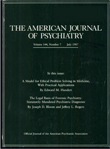Learning and Memory in Rape Victims With Posttraumatic Stress Disorder
Abstract
OBJECTIVE: Studies have shown memory deficits among combat veterans with posttraumatic stress disorder (PTSD); however, high rates of comorbid conditions, including alcoholism, make it difficult to definitively associate these findings with the PTSD diagnosis. In this study the authors examined memory functioning among rape survivors without alcoholism or substance abuse but with PTSD. METHOD: Rape victims with (N=15) and without (N=16) PTSD were compared to age- and education-matched nontraumatized comparison subjects (N=16) on measures of learning and memory. RESULTS: The subjects with PTSD performed significantly worse than the other groups on delayed free recall. The deficits were ameliorated by cueing and recognition testing. CONCLUSIONS: Recall deficits in noncombat PTSD patients strengthen the theory that memory deficits are associated with the PTSD diagnosis. The deficits were mild and were not attributable to comorbid depression, anxiety, or substance abuse. (Am J Psychiatry 1998; 155:278–279)



